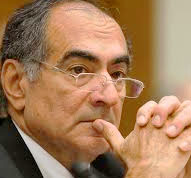Arab Americans
John Mack
John J. Mack (born on November 17, 1944) is a Senior Advisor and the former CEO & Chairman of the Board at Morgan Stanley, the New York-based investment bank and brokerage firm. Mack announced his retirement as Chief Executive Officer on September 10, 2009, which was effective January 1, 2010.[1] Former Co-President James P. Gorman succeeded him as CEO.
Early life and education
Born in 1944, Mack was the sixth son to Lebanese immigrants of Eastern Orthodox and Melkite origin, whose original family name was Makhoul.[2] His father, Charles, came to America at the age of 12, following his father who had arrived at Ellis Island in 1908 and had settled in North Carolina.[3] Charles ran a wholesale grocery, clothing, and general merchandise store in Mooresville, N.C.
Mack graduated from Duke University in 1968, where he attended on a football scholarship and is now a member of the Board of Trustees.
Mack’s first job in finance was as a clerk at a small brokerage house during his junior year at Duke, after a cracked vertebra made it impossible for him to continue on his football scholarship.
Career
Mack worked at several firms around Wall Street before starting his career at Morgan Stanley in 1972 as a salesman, and has since worked for the company for nearly thirty years. Rising steadily to positions of increasing responsibility, Mack eventually headed the firm’s Worldwide Taxable Fixed Income Division from 1985 to 1992. In 1987, he became a member of the board of directors. In March 1992, he assumed responsibility for Morgan Stanley’s day-to-day operations as chairman of the operating committee. He was named President of Morgan Stanley in June 1993. Mack served as president, chief operating officer and a director of Morgan Stanley Dean Witter & Co. from May 1997 when the firm was created by the merger of Morgan Stanley and Dean Witter, two of the world’s leading financial services companies. He left in 2001 after a power struggle with Phil Purcell; Purcell became CEO of Morgan Stanley after the 1997 merger of Morgan Stanley and Dean Witter, of which Purcell was already CEO. Mack took on the CEO position at Credit Suisse First Boston (CSFB) six months after that time.
He earned the nickname Mack the Knife for his cost-cutting prowess while managing the fixed income division at Morgan Stanley, and he lived up to his billing at CSFB, where he cut 10,000 jobs and returned the bank to profitability.
Mack returned to Morgan Stanley on June 30, 2005 as chief executive officer and chairman of the board, replacing Purcell. Mack was noted for stabilizing the firm and reenergizing its culture and client franchise.[4][5]
Insider trading accusations
Mack was accused by former SEC investigator Gary J. Aguirre of insider trading. On October 5, 2006, the SEC recommended no action be taken against Mack.[6] In late November 2006, Mack and Pequot were notified that the investigation had been closed and no action would be taken against them.
Compensation
While CEO of Morgan Stanley in 2006, John J. Mack earned a total compensation of $41,399,010, which included a base salary of $800,000, stocks granted of $36,179,923, and options granted of $4,019,934.[7]
In 2008, he earned a total compensation of $1,235,097, which included a base salary of $800,000 and other compensation of $435,097. He did not receive any cash, stock, or options.[8]
Financial crisis of 2007–2009
Mack guided the firm through the financial crisis of 2008, building its capital position and overseeing the firm’s conversion to a bank holding company. To stabilize the firm, he forged strategic alliances with China Investment Corporation and Mitsubishi UFJ Group and entered into a joint venture with Smith Barney, forming at the time the world’s largest wealth management firm.[9] During the crisis, Mack was advised by U.S. Treasury Secretary Hank Paulson and the head of the Federal Reserve Bank Ben Bernanke to sell Morgan Stanley. He has stated that during negotiations he was under considerable pressure from the president of the New York Federal Reserve, Tim Geithner, to sell or merge Morgan Stanley to one of his competitors such as JP Morgan. Mack saw this as being contrary to the interests of Morgan Stanley shareholders and employees, similar to the demise of Bear Stearns in a forced sale to JP Morgan for $2 per share, (the deal was later revised to $10 a share), and insisted on finding other sources of financing instead.[10]
Other
Mack is a chairman of the board of trustees of New York-Presbyterian Hospital, the University Hospital of both Columbia and Cornell Universities. He is also a director of IMG, a board member of the Bloomberg Family Foundation, and a member of the Business Council and the Business Roundtable. In addition, Mack serves on the International Advisory Council for China Investment Corporation, the International Business Leaders Advisory Council for the Mayor of Beijing, the International Advisory Panel of The Monetary Authority of Singapore, and the executive committee of the Partnership for New York City.[11] In 2005, the C.J. Mack Family Foundation provided an endowment arranged by Mack to the United States Naval Academy Foundation to support the Admiral Frank Bowman Scholar Program. In November 2011, Mack joined the board of directors of Rev Worldwide.[12] In 2012, Mack became a senior advisor of KKR and a board member of Lending Club.[13][14]
In media
Mack was portrayed in the HBO film Too Big to Fail by Tony Shalhoub and in the BBC film The Last Days of Lehman Brothers by Henry Goodman. His career is also covered in detail in a 2007 book by Patricia Beard, Blue Blood and Mutiny: The Fight for the Soul of Morgan Stanley.
Notes
- Jump up^ https://www.morganstanley.com/about/press/articles/ad3bec19-9e49-11de-b417-0db96b986471.html
- Jump up^ Landon Thomas Jr. From Lebanese- American Financiers, Differing Views on the Strife New York Times, August 1, 2006
- Jump up^ [2] [3]
- Jump up^ http://www.morganstanley.com/about/press/articles/ad3bec19-9e49-11de-b417-0db96b986471.html
- Jump up^ Was Purcell right about Morgan Stanley after all?
- Jump up^ http://www.businessweek.com/ap/financialnews/D8KIOU380.htm
- Jump up^ 2007 CEO Compensation for John J. Mack, Equilar
- Jump up^ 2008 CEO Compensation for John J. Mack, Equilar
- Jump up^ http://www.morganstanley.com/about/press/articles/0f9d8d36-4ea4-11de-96f6-3f25a44c9933.html
- Jump up^ “John Mack on Saving Morgan Stanley, Inside the Bunker” (FLASH VIDEO(26:22)). Wharton School of the University of Pennsylvania. October 14, 2009. Retrieved May 19, 2010.
- Jump up^ http://www.morganstanley.com/company/governance/board.html
- Jump up^ Brett Philbin John Mack Is Finding His Next Act Deal Journal, Nov. 9, 2011
- Jump up^ David Benoit John Mack to Join KKR as Senior Adviser Deal Journal, March 27, 2011
- Jump up^ Dakin Campbell Ex-Morgan Stanley CEO John Mack Joins LendingClub BoardBusinessweek, April 12, 2012



